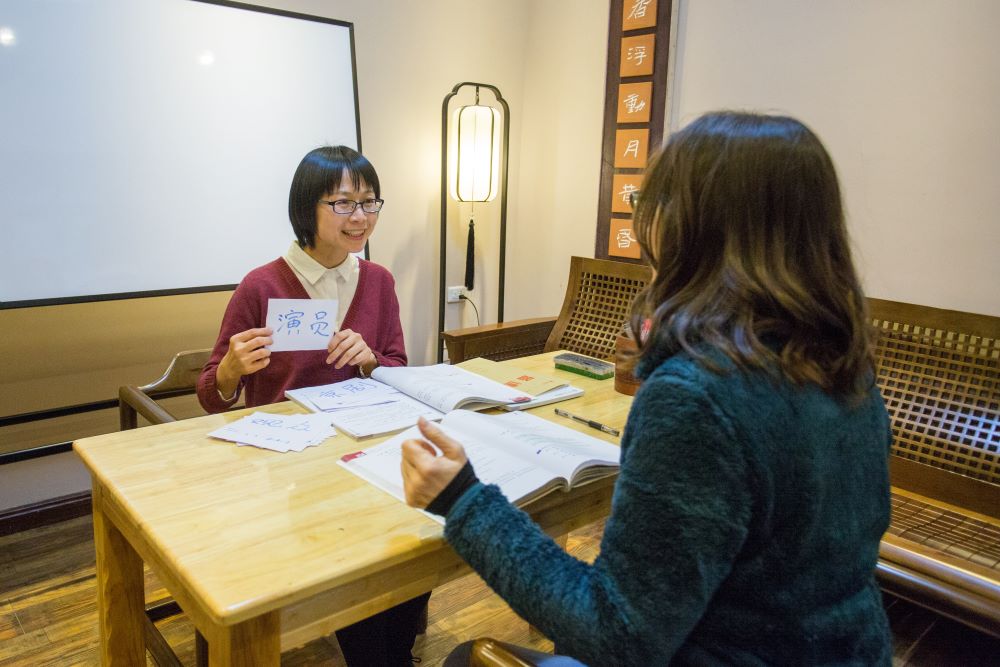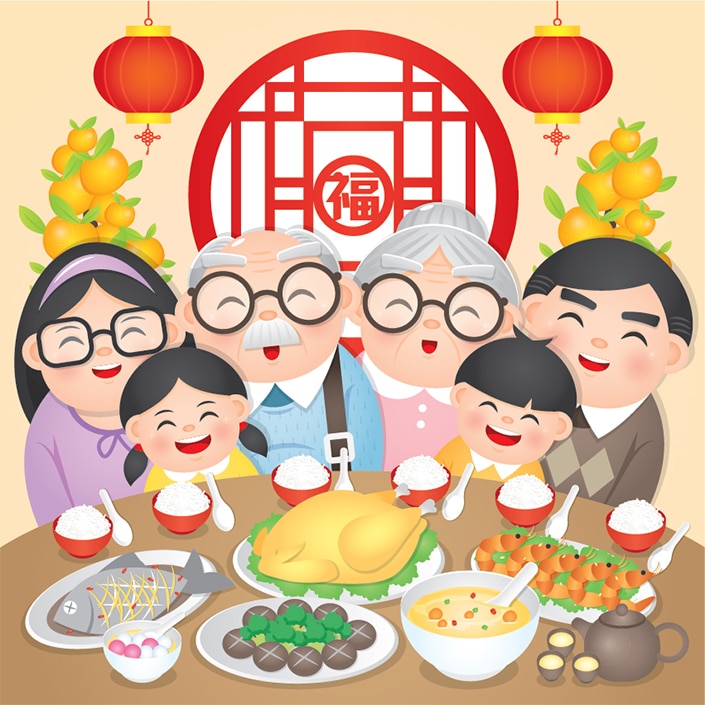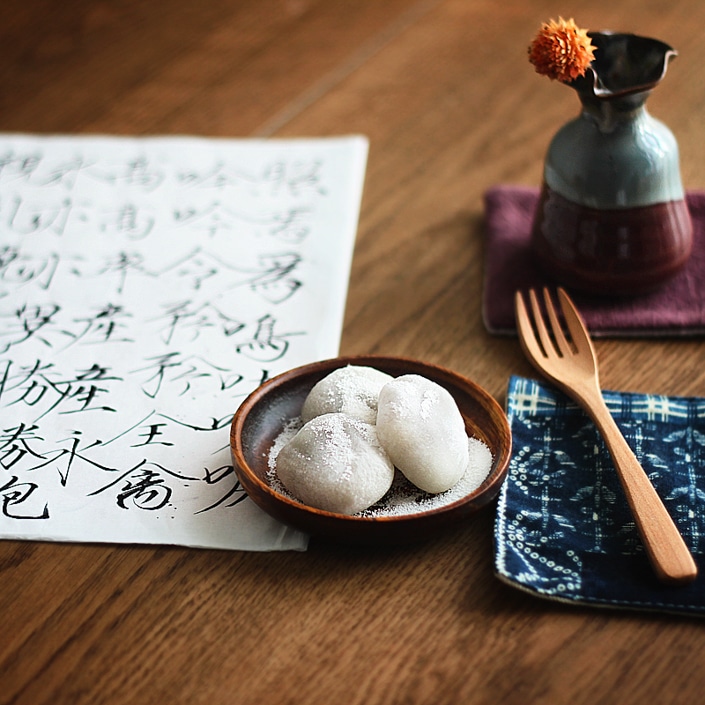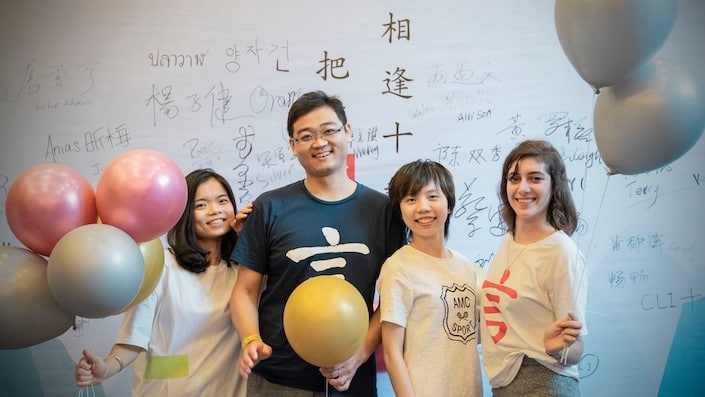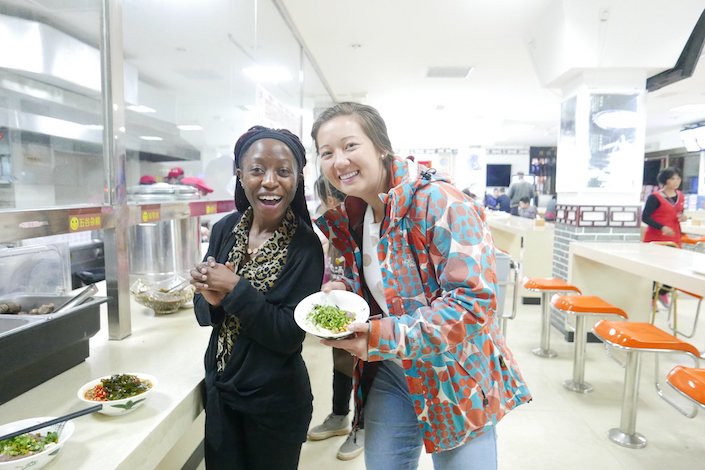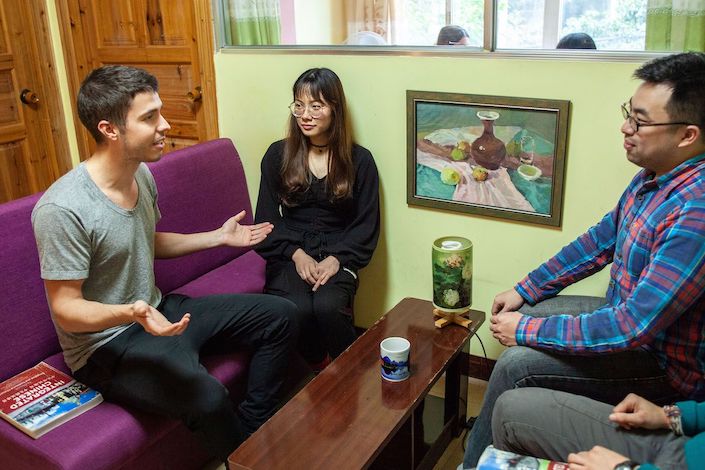How Do I Say My Name in Chinese?
Learn Chinese in China or on Zoom and gain fluency in Chinese!
Join CLI and learn Chinese with your personal team of Mandarin teachers online or in person at the CLI Center in Guilin, China.
When traveling about in China, you’ll need to introduce yourself to those you meet along the way. The vast differences between Chinese and English mean it’s important to know the Chinese equivalent of your English name. Read on to discover how to say your name in Chinese!

Table of Contents
Chinese translations of common English names for women
The names listed below were the most common names for women in the United States between 1920-2019, according to the Social Security Administration.
| English Name | Chinese Equivalent | Pinyin |
|---|---|---|
| Abigail | 亚比该 | Yǎbǐgāi |
| Alexis | 阿列克西斯 | Ālièkèxīsī |
| Alice | 爱丽丝 | Àilìsī |
| Amanda | 阿曼达 | Āmàndá |
| Amber | 安柏 | Ānbǎi |
| Amy | 艾米 | Àimǐ |
| Andrea | 安德烈娅 | Āndélièyà |
| Angela | 安格拉 | Āngélā |
| Ann | 安 | Ān |
| Anna | 安娜 | Ānnà |
| Ashley | 阿什利 | Āshénlì |
| Barbara | 芭芭拉 | Bābālā |
| Betty | 贝蒂 | Bèidì |
| Beverly | 比佛利 | Bǐfúlì |
| Brenda | 布兰达 | Bùlándá |
| Brittany | 布莱特妮 | Bùláitènī |
| Carol | 卡罗尔 | Kǎluó‘ěr |
| Carolyn | 卡罗琳 | Kǎluólín |
| Catherine | 凯瑟琳 | Kǎisèlín |
| Charlotte | 夏洛特 | Xiàluòtè |
| Cheryl | 谢丽尔 | Xièlì’ěr |
| Christina | 克里斯蒂娜 | Kèlǐsīdìnà |
| Christine | 克丽丝汀 | Kèlìsītīng |
| Cynthia | 辛西雅 | Xīnxīyǎ |
| Danielle | 丹妮尔 | Dānnī'ěr |
| Deborah | 底波拉 | Dǐbōlā |
| Debra | 黛博拉 | Dàibólā |
| Denise | 丹妮丝 | Dānnīsī |
| Diana | 戴安娜 | Dài'ānnà |
| Diane | 黛安 | Dài’ān |
| Donna | 唐娜 | Tángnà |
| Doris | 多丽丝 | Duōlìsī |
| Dorothy | 多萝西 | Duōluóxī |
| Elizabeth | 伊丽莎白 | Yīlìshābái |
| Emily | 埃米莉 | Āimǐlì |
| Emma | 爱玛 | Àimǎ |
| Evelyn | 伊芙琳 | Yīfúlín |
| Frances | 弗兰西丝 | Fúlánxīsī |
| Gloria | 格洛丽亚 | Géluòlìyà |
| Grace | 格蕾丝 | Gélěisī |
| Hannah | 汉娜 | Hànnà |
| Heather | 海瑟 | Hǎisè |
| Helen | 海伦 | Hǎilún |
| Isabella | 伊莎贝拉 | Yīshābèilā |
| Jacqueline | 杰奎琳 | Jiékuílín |
| Janet | 珍妮特 | Zhēnnītè |
| Janice | 珍妮丝 | Zhēnnīsī |
| Jean | 珍 | Zhēn |
| Jennifer | 珍妮佛 | Zhēnnīfú |
| Jessica | 杰西卡 | Jiéxīkǎ |
| Joan | 琼 | Qióng |
| Joyce | 乔伊斯 | Qiáoyīsī |
| Judith | 朱迪思 | Zhūdísī |
| Judy | 朱迪 | Zhūdí |
| Julia | 朱莉亚 | Zhūlìyà |
| Julie | 朱丽 | Zhūlì |
| Karen | 凯伦 | Kǎilún |
| Katherine | 凯萨琳 | Kǎisàlín |
| Kathleen | 凯瑟琳 | Kǎisèlín |
| Kathryn | 凯瑟琳 | Kǎisèlín |
| Kayla | 凯拉 | Kǎilā |
| Kelly | 凯利 | Kǎilì |
| Kimberly | 金伯利 | Jīnbólì |
| Laura | 劳拉 | Láolā |
| Lauren | 劳伦 | Láolún |
| Linda | 琳达 | Líndá |
| Lisa | 丽莎 | Lìshā |
| Madison | 麦迪逊 | Màidíxùn |
| Margaret | 玛格丽特 | Mǎgélìtè |
| Maria | 玛丽亚 | Mǎlìyǎ |
| Marie | 玛丽 | Mǎlì |
| Marilyn | 玛丽莲 | Mǎlìlián |
| Martha | 玛莎 | Mǎshā |
| Mary | 玛丽 | Mǎlì |
| Megan | 梅根 | Méigēn |
| Melissa | 梅丽莎 | Méilìshā |
| Michelle | 米歇尔 | Mǐxiē'ěr |
| Nancy | 南希 | Nánxī |
| Natalie | 娜塔莉 | Nàtǎlì |
| Nicole | 妮可 | Nīkě |
| Olivia | 奥利维亚 | Àolìwéiyǎ |
| Pamela | 帕米拉 | Pàmǐlā |
| Patricia | 帕特丽夏 | Pàtèlìxià |
| Rachel | 雷切尔 | Léiqiè'ěr |
| Rebecca | 利百加 | Lìbǎijiā |
| Rose | 萝丝 | Luósī |
| Ruth | 路得 | Lùdé |
| Samantha | 萨曼莎 | Sàmànshā |
| Sandra | 桑德拉 | Sāngdélā |
| Sara | 莎拉 | Shālā |
| Sarah | 莎拉 | Shālā |
| Sharon | 雪伦 | Xuělún |
| Shirley | 雪莉 | Xuělì |
| Sophia | 索菲亚 | Suǒfēiyà |
| Stephanie | 丝黛芬妮 | Sīdàifēnnī |
| Susan | 苏珊 | Sūshān |
| Teresa | 特里萨 | Tèlǐsà |
| Theresa | 特里萨 | Tèlǐsà |
| Victoria | 维多利亚 | Wéiduōlìyǎ |
| Virginia | 弗吉尼亚 | Fújíníyǎ |
Chinese translations of common English names for men
According to the Social Security Administration, the names below were the most common names for U.S. men between 1920-2019.
| English Name | Chinese Equivalent | Pinyin |
|---|---|---|
| Aaron | 亚伦 | Yàlún |
| Adam | 亚当 | Yàdāng |
| Alan | 艾伦 | Àilún |
| Albert | 阿尔伯特 | Ā'ěrbótè |
| Alexander | 亚力山大 | Yàlìshāndà |
| Andrew | 安德鲁 | Āndélǔ |
| Anthony | 安东尼 | Āndōngní |
| Arthur | 亚瑟 | Yàsè |
| Austin | 奥斯汀 | Àosītīng |
| Benjamin | 本杰明 | Běnjiémíng |
| Billy | 比利 | Bǐlì |
| Bobby | 巴比 | Bābǐ |
| Bradley | 布莱德利 | Bùláidélì |
| Brandon | 布兰登 | Bùlándēng |
| Brian | 布莱恩 | Bùlái'ēn |
| Bruce | 布鲁斯 | Bùlǔsī |
| Bryan | 布赖恩 | Bùlài'ēn |
| Carl | 卡尔 | Kǎ'ěr |
| Charles | 查尔斯 | Chá'ěrsī |
| Christian | 克里斯蒂安 | Kèlǐsīdì'ān |
| Christopher | 克里斯托弗 | Kèlǐsītuōfú |
| Daniel | 丹尼尔 | Dānní'ěr |
| David | 大卫 | Dàwèi |
| Dennis | 丹尼斯 | Dānnísī |
| Donald | 唐纳德 | Tángnàdé |
| Douglas | 道格拉斯 | Dàogélāsī |
| Dylan | 迪伦 | Dílún |
| Edward | 爱德华 | Àidéhuá |
| Eric | 埃里克 | Āilǐkè |
| Ethan | 伊桑 | Yīsāng |
| Eugene | 尤金 | Yóujīn |
| Frank | 弗兰克 | Fúlánkè |
| Gabriel | 加百列 | Jiābǎiliè |
| Gary | 加里 | Jiālǐ |
| George | 乔治 | Qiáozhì |
| Gerald | 杰拉尔德 | Jiélā'ěrdé |
| Gregory | 格里高利 | Gélǐgāolì |
| Harold | 哈罗德 | Hāluōdé |
| Henry | 亨利 | Hēnglì |
| Jack | 杰克 | Jiékè |
| Jacob | 雅各 | Yǎgè |
| James | 詹姆斯 | Zhānmǔsī |
| Jason | 杰森 | Jiésēn |
| Jeffrey | 杰弗里 | Jiéfúlǐ |
| Jeremy | 杰里米 | Jiélǐmǐ |
| Jerry | 杰瑞 | Jiéruì |
| Jesse | 杰西 | Jiéxī |
| Joe | 乔 | Qiáo |
| John | 约翰 | Yuēhàn |
| Johnny | 强尼 | Qiángní |
| Jonathan | 乔纳森 | Qiáonàsēn |
| Jordan | 约旦 | Yuēdàn |
| Jose | 霍赛 | Huòsài |
| Joseph | 约瑟夫 | Yuēsèfū |
| Joshua | 约书亚 | Yuēshūyà |
| Juan | 胡安 | Hú'ān |
| Justin | 贾斯汀 | Jiǎsītīng |
| Keith | 基思 | Jīsī |
| Kenneth | 肯尼思 | Kěnnísī |
| Kevin | 克文 | Kèwén |
| Kyle | 凯尔 | Kǎi'ěr |
| Larry | 拉里 | Lālǐ |
| Lawrence | 劳伦斯 | Láolúnsī |
| Logan | 罗根 | Luógēn |
| Louis | 路易斯 | Lùyìsī |
| Mark | 马克 | Mǎkè |
| Matthew | 马太 | Mǎtài |
| Michael | 迈克尔 | Màikè'ěr |
| Nathan | 內森 | Nèisēn |
| Nicholas | 尼古拉斯 | Nígǔlāsī |
| Noah | 诺亚 | Nuòyǎ |
| Patrick | 帕特里克 | Pàtèlǐkè |
| Paul | 保罗 | Bǎoluó |
| Peter | 彼得 | Bǐdé |
| Philip | 斐理伯 | Fěilǐbó |
| Ralph | 拉尔夫 | Lā'ěrfū |
| Randy | 兰迪 | Lándí |
| Raymond | 雷蒙德 | Léiméngdé |
| Richard | 理查德 | Lǐchádé |
| Robert | 罗伯特 | Luóbótè |
| Roger | 罗杰 | Luójié |
| Ronald | 罗纳德 | Luónàdé |
| Roy | 罗伊 | Luōyī |
| Russell | 罗素 | Luósù |
| Ryan | 赖安 | Laì'ān |
| Samuel | 塞缪尔 | Sāimiù'ěr |
| Scott | 斯考特 | Sīkǎotè |
| Sean | 肖恩 | Xiào'ēn |
| Stephen | 斯蒂芬 | Sīdìfēn |
| Steven | 史蒂文 | Shǐdìwén |
| Terry | 特利 | Tèlè |
| Thomas | 托马斯 | Tuōmǎsī |
| Timothy | 提摩太 | Tímótài |
| Tyler | 泰勒 | Tàilè |
| Vincent | 文森特 | Wénsēntè |
| Walter | 瓦尔特 | Wǎ'ěrtè |
| Wayne | 韦恩 | Wéi'ēn |
| William | 威廉 | Wēilián |
| Willie | 威利 | Wēilì |
| Zachary | 匝加利 | Zājiālì |
English versus Chinese names
Many long-term expats and Mandarin language students will tell you that the most enriching aspect of their experience in China was meeting new people and making friends with locals.
Knowing how to introduce yourself when you first start meeting new people in China can be tough, though, since direct equivalents of English names are not used in China (except perhaps in English class).
While many young people in big Chinese cities like Shanghai and Beijing speak English and are familiar with the English pronunciation of most common English names, older people and people living in smaller cities like Guilin may struggle to recognize, remember and pronounce them.

When meeting people in China, it's important to know how to say your name in Chinese.
Chinese names
Generally, choosing a culturally appropriate Chinese moniker for yourself is highly recommended.
The logic behind names in China is quite different from the logic behind names in the West, however. Therefore, deciding what to call yourself in China can be somewhat complicated and generally requires assistance from a Chinese language teacher.
Many foreigners who have spent many years interacting with China and learning Chinese have chosen special “Chinese names.”
These unique appellations are usually chosen based on the sounds and meanings of the Chinese characters that they include, instead of being direct transliterations of their English equivalents.
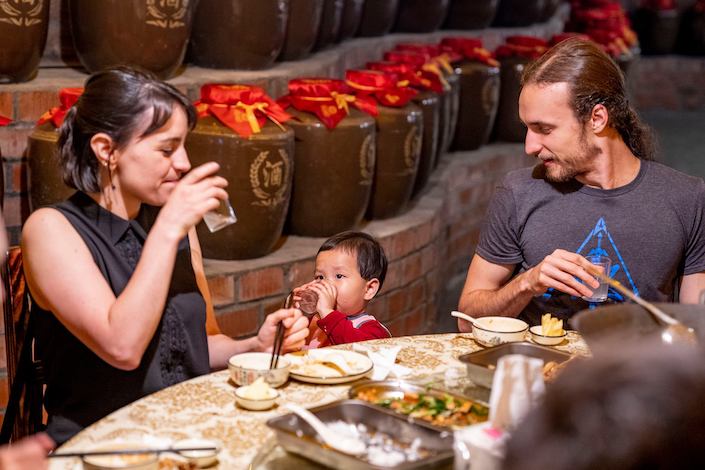
Choosing a culturally appropriate Chinese name for yourself requires time and effort.
Good examples of foreigners who have chosen authentic Chinese names for themselves include sinologist Jonathon Spence, who goes by 史景迁 (Shǐ Jǐngqiān), and writer Peter Hessler, who is known as 何伟 (Hé Wěi) in China.
If for some reason you don’t have time to consult a Chinese teacher when choosing a Chinese moniker for yourself, it’s still useful to know what the accepted Chinese equivalent of your English name is so you can use it to introduce yourself to your new friends in China.
View this post on Instagram
Chinese transliterations of English names
Westerners have been interacting with China for hundreds of years, so even though English names aren’t used in China, generally accepted equivalents for many of them do exist. In almost every case, these names are actually transliterations of the English versions.
Although the Chinese equivalents of common English names may look completely unrecognizable when written in Chinese characters, many of them look quite similar to their English counterparts when written in pinyin.
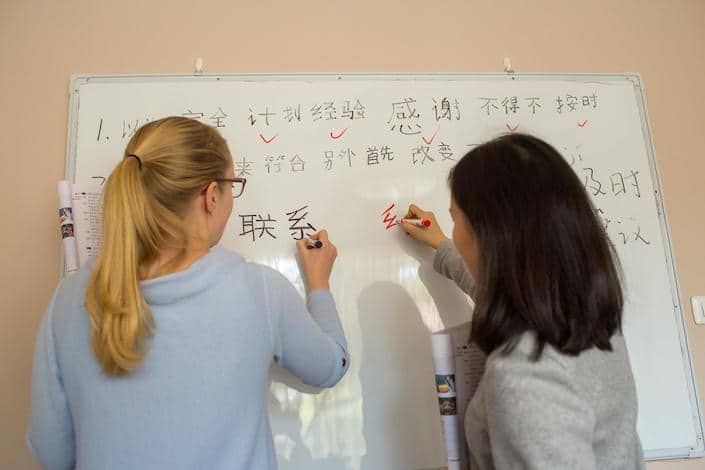
Common English names can be written in Chinese through a process of transliteration.
For example, the Chinese characters for Natalie are 娜塔莉, but the pinyin is written as Nàtǎlì. Likewise, Anna is written as 安娜 using Chinese characters, but its pinyin equivalent, Ānnà, is almost identical to the English version (aside from the tone marks).
Transliterated English names may sound a bit odd to the untrained ear due to the fact that phonetically translating each syllable using Chinese characters means that the Chinese versions must be pronounced using Chinese tones. However, with practice, you’ll soon learn to recognize the similarities between the Chinese versions and the English originals.
Choosing appropriate Chinese characters
Another interesting aspect of Chinese transliterations of English names is the fact that the transliterations often follow some of the same rules that Chinese parents take into consideration when naming their children.

The characters used in Chinese transliterations of common English names are usually chosen according to a special set of rules and cultural norms.
Auspicious meanings
Chinese parents usually try to choose names that feature Chinese characters with auspicious meanings. In a similar vein, many of the characters used in Chinese transliterations of English names also have positive or auspicious meanings.
For example, the character 德 (dé), which means “virtue,” is contained in the Chinese transliterations of frequently used English monikers like Richard (理查德 Lǐchádé) and Harold (哈罗德 Hāluōdé).
Likewise, the character 安 (ān), which means “peace,” is included in the transliteration of Anthony (安东尼 Āndōngní) and Ryan (赖安 Laì'ān).
Other characters with positive connotations, such as 杰 (jié, outstanding person, hero) and 特 (tè, exceptional) can be found in multiple different Chinese transliterations of English names.
Gender-based naming conventions
When choosing names for girls, Chinese parents frequently choose characters with connotations that are traditionally thought of as being “feminine.”
This habit has also carried over into the choice of characters used in Chinese transliterations of traditionally female English names. For example, both Patricia (帕特丽夏 Pàtèlìxià) and Elizabeth (伊丽莎白 Yīlìshābái), contain the character 丽 (lì), which means beautiful or pretty.
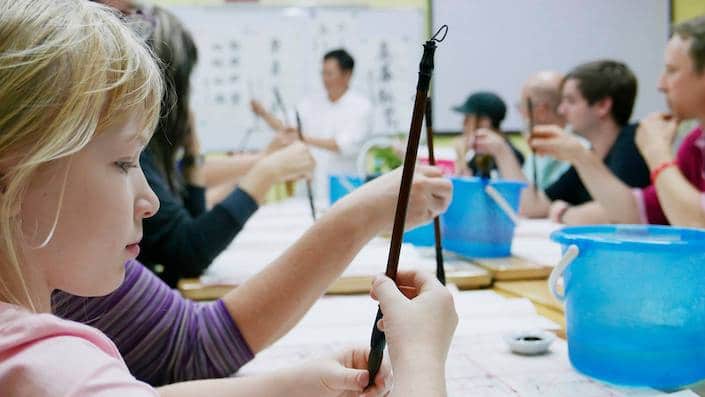
English girls' names are often transliterated using characters associated with feminine characteristics.
What about surnames?
In general, Chinese surnames are only one character long. Most foreign surnames, however, often consist of at least two syllables. Thus, when transliterating foreign surnames directly into Chinese, it is often not possible to use a common Chinese surname as a substitute. Rather, it is most common to simply transcribe English surnames phonetically using pinyin.
Chinese surnames generally come first, before given names, in contrast to English surnames, which come last. Traditionally, when full English names that include both the first name and the surname are rendered in Chinese, the English word order is usually retained.
To show where the given name ends and the surname begins, a dot symbol is often used. For example, basketball star Kobe Bryant is generally referred to as 科比·布莱恩特 (Kēbǐ·Bùlái'ēntè) in China.

Unlike English surnames, Chinese surnames come first, before given names.
What’s in a name?
Although Chinese equivalents of English names are not commonly used in China and it’s always better to choose a more authentic Chinese moniker, there are times when knowing some of the most common Chinese transliterations can be useful.
Examining the strategies used to produce these transliterations also provides fascinating insights into Chinese culture.
Curious to know how to say your name in Chinese? Check out our lists of popular English names and their Chinese equivalents below!
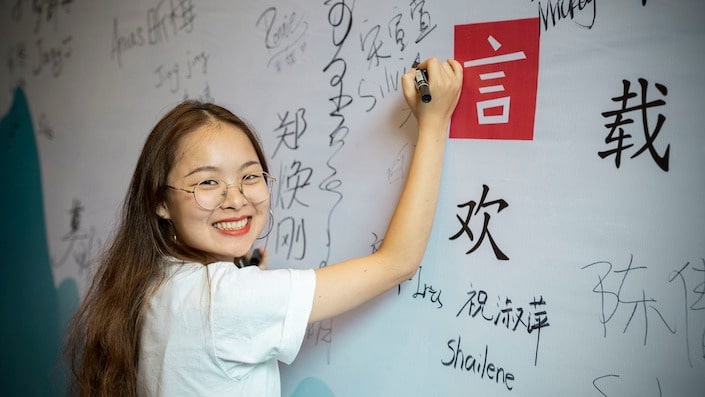
Learning to say your name in Chinese is essential for those who plan to travel in China.




